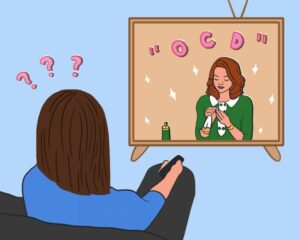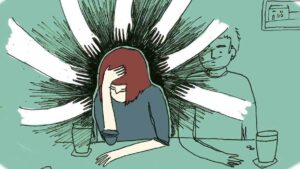Do you know what OCD is? Chances are, you have heard of it before, but you may not know exactly what it is. OCD is a mental disorder that causes people to have intrusive thoughts and compulsive behaviors. In this blog post, we will discuss some of the key facts about OCD. We will also talk about the different treatment options available for those who suffer from this condition.
Contents
What Is OCD?
 OCD is an anxiety disorder that causes people to have obsessive thoughts and repetitive behaviors. OCD affects about two percent of the population and is equally common in men and women. There are two types of OCD: primary OCD and secondary OCD.
OCD is an anxiety disorder that causes people to have obsessive thoughts and repetitive behaviors. OCD affects about two percent of the population and is equally common in men and women. There are two types of OCD: primary OCD and secondary OCD.
Primary OCD is when a person has obsessions and compulsions that are not related to another mental disorder or event. Secondary OCD is when a person has obsessions and compulsions that are caused by another mental disorder or event.
In fact, OCD is a condition that can be treated with medication and therapy. If you or someone you know has OCD, there are many resources available to help. OCD is not a choice. People with OCD cannot just “snap out of it.” OCD is a real medical condition that requires treatment.
It is way more important to focus on what a person with OCD is doing to manage their disorder and live a happy, productive life in spite of it. So, more often than not, the best thing you can do for someone with OCD is to simply be there for them and offer your support.
What Are Some OCD Facts?
OCD facts are simply information about OCD that can help you better understand the condition. Many people think of OCD as a joking matter, but it is a real and serious mental illness. There are several OCD facts that can help you better understand what the condition is. And how it affects those who suffer from it.
Moreover, it is essential to know some OCD facts if you or a loved one suffer from the condition. Eventually, you can develop better coping mechanisms and get the proper treatment.
10 OCD Facts
OCD Causes Significant Anxiety
It is foremost fact about the condition that you should know. OCD can cause significant anxiety in patients. In fact, anxiety is one of the main symptoms of OCD. It can be so severe that it interferes with work, school, and social activities. Anxiety is really distressing and can make it difficult to concentrate or focus on anything else.
Moreover, OCD can also cause physical symptoms such as
- sweating,
- shaking,
- and a racing heart.
These physical symptoms can be very debilitating and make it hard to function in day-to-day life. However, with proper treatment, many people with OCD are able to lead normal and productive lives.
OCD Is Not Just About Hand Washing or Being Neat
 This is often the first thing people think of when they hear the term OCD, but it represents a very small portion of what OCD is really about. In its simplest form, OCD is an anxiety disorder that manifests in the form of intrusive, unwanted thoughts (obsessions) that drive repetitive behaviors (compulsions).
This is often the first thing people think of when they hear the term OCD, but it represents a very small portion of what OCD is really about. In its simplest form, OCD is an anxiety disorder that manifests in the form of intrusive, unwanted thoughts (obsessions) that drive repetitive behaviors (compulsions).
While handwashing and being neat may be a part of someone’s OCD, it is not the whole story. Other obsessions can include:
- Fear of contamination or dirt
- Intrusive thoughts about harm coming to oneself or others
- Excessive focus on symmetry, order, and perfectionism
- Unwanted sexual or aggressive thoughts
Obsessions can be accompanied by mental rituals (like counting, repeating words silently, or avoiding certain triggers). And physical compulsions (like excessive handwashing, ordering, tapping, or touching).
It’s important to remember that people with OCD are not actually trying to be annoying or difficult. They are driven by a very real fear that something bad will happen if they don’t perform their rituals.
OCD Affects All Types Of Human Beings
OCD is a condition that affects all types of human beings. It is not just a mental disorder that only affects certain people. OCD can affect anyone, regardless of age, gender, or race.
It is often misunderstood as a mental disorder that only affects rich, white people. This is not the case. In fact, OCD affects people from all walks of life. There are many different types of OCD, and each type can present itself differently.
For example, some people with OCD might obsessively clean their homes. While others might compulsively check the locks on their doors over and over again. So, there are no two cases of OCD that are exactly alike. This condition can harm anyone, no matter who they are.
OCD Symptoms Usually Starts In Adolescence
It is believed that OCD usually starts during adolescence. However, it can also start in childhood or adulthood. There are many different symptoms of OCD, but the most common symptoms that show up during adolescence are;
- Excessive hand washing
- Checking things repeatedly
- Arranging things in a certain order
- Hoarding things
- Obsessing over numbers and symmetry
These are only a few of the many different symptoms that people with OCD can experience. In addition, the symptoms in each person can vary greatly in severity. Some people with OCD may only have a few mild symptoms, while others may have severe and disabling symptoms.
Therefore, it is important to recognize the symptoms of OCD and to seek help if you or someone you know is experiencing them. If left untreated, OCD can cause a great deal of distress. And can interfere with a person’s ability to function in their everyday life.
OCD Is Often Misdiagnosed
 This is particularly true in children, who may be mistakenly diagnosed with ADHD when they actually have OCD. In fact, research has shown that as many as one in three kids with ADHD also have OCD. Also, OCD can also be mistaken for depression or anxiety disorders, since the symptoms can overlap.
This is particularly true in children, who may be mistakenly diagnosed with ADHD when they actually have OCD. In fact, research has shown that as many as one in three kids with ADHD also have OCD. Also, OCD can also be mistaken for depression or anxiety disorders, since the symptoms can overlap.
For example, someone who is depressed may have intrusive thoughts about death or harming themselves. However, someone with OCD may have intrusive thoughts about dirt and germs. And feel the need to wash their hands over and over again to ward off the contamination.
The misdiagnosis of OCD can lead to the wrong treatment. So, it’s important to be aware of the symptoms of OCD and to get a proper diagnosis from a mental health professional.
OCD Can Be Severely debilitating
For some people, OCD can be severely debilitating. It can take over their lives and make it difficult to function at work, school, or in social situations. In severe cases, people with OCD may become housebound. Moreover, OCD can be accompanied by depression, anxiety, and substance abuse.
Mental health conditions are always debilitating in some ways, but some are more severe than others. OCD is classified as a mental health condition, and it can be severely debilitating for those who suffer from it. If you or someone you know suffers from OCD, it’s important to understand the facts about this disorder.
OCD Can Be Inherited
If you have OCD, there is a good chance that it runs in your family. Studies have shown that OCD can be passed down from generation to generation. In fact, genetics are believed to play a role in up to 40% of all cases of OCD.
The reason behind this is still unknown, but it is believed that the behavior may be learned and passed down through the family. If you have OCD, it is important to tell your family members so they can be aware of the disorder and help you manage it.
In fact, studies have shown that early intervention and treatment can be very effective in managing OCD. So, if you or someone you know is struggling with OCD, don’t hesitate to reach out for help.
OCD Can Be Triggered by Trauma
While the exact cause of OCD is still unknown, it is believed that the disorder can be triggered by trauma. Trauma can include everything from witnessing a traumatic event to experiencing abuse or neglect. If you have OCD, it’s important to seek professional help to deal with your symptoms.
The trauma can be any type, some of these include;
- witnessing a natural disaster
- a car accident
- experiencing abuse or neglect
So, OCD is a condition that is really brought on by some sort of outside force and then the person begins to have these intrusive thoughts. These thoughts can be about anything that causes anxiety or discomfort. So, be aware of what may trigger your OCD and try to avoid those triggers if possible.
OCD Is A Chronic Mental Illness
 It is important to remember that OCD is a chronic mental illness. This means that it is a long-term condition that can last for years or even a lifetime. It is important to seek professional help if you think you may have OCD. But, there have been studies that suggest that some people with OCD may be able to recover without treatment.
It is important to remember that OCD is a chronic mental illness. This means that it is a long-term condition that can last for years or even a lifetime. It is important to seek professional help if you think you may have OCD. But, there have been studies that suggest that some people with OCD may be able to recover without treatment.
Chronic mental illness is simply a mental illness that lasts for a long time. Moreover, this condition is not curable, but it is treatable. If you think that you may have OCD, the best thing to do is to seek professional help as soon as possible. Early diagnosis and treatment can make a big difference in your overall prognosis.
Possible To Live With OCD
Although OCD is a serious mental illness, it is possible to live with OCD. There are many people who suffer from OCD who are able to manage their symptoms and lead happy, healthy, and productive lives. Yes, it is true that it is a chronic illness but it is also a fact that you can live with OCD.
OCD is a treatable mental illness that affects millions of people around the world. If you or someone you know is struggling with OCD, there is help available. This can help you manage your OCD and live a happy, healthy life.
So, these are OCD facts that you need to know. OCD is a serious mental illness but it is possible to live with OCD. If you or someone you know is struggling with OCD, there is help available. Seek professional help and start living a happy, healthy life today. Also, be aware that OCD is a chronic illness but with proper treatment, people can manage their symptoms and lead happy, productive lives.
What Are Negative Impacts Of OCD In Life?
 OCD is a mental health disorder that can have significant negative impacts on a person’s life. There are numerous negative impacts, some of these include;
OCD is a mental health disorder that can have significant negative impacts on a person’s life. There are numerous negative impacts, some of these include;
- Interference with work, school, or other important activities
- Avoiding things that trigger OCD thoughts and behaviors (such as contamination) can lead to social isolation
- Difficulty maintaining healthy relationships due to avoidance, secrecy, and arguments about the disorder
- Financial difficulties due to the cost of treatment and loss of productivity
- Health problems due to the physical effects of anxiety and stress associated with OCD.
Moreover, the negative impacts of OCD can also extend to family and friends. They may feel helpless watching a loved one suffer, and they may also develop their own emotional problems such as anxiety or depression.
If you or someone you know is struggling with OCD, it’s important to seek professional help. Treatment for OCD can be very effective, and there are many resources available to support people with the disorder and their loved ones.
How To Manage OCD?
When you are aware of what are OCD facts, then you will be able to better manage the condition. OCD is a type of anxiety disorder that causes people to have repetitive and intrusive thoughts, impulses, or images. People with OCD often have difficulty managing their symptoms and may engage in compulsive behaviors to try to ease their anxiety.
Here are some ways to manage your OCD;
Talk to your loved ones
When you identify your OCD thoughts and behaviors, it can be helpful to talk to your loved ones about it. This will help them understand what you are going through and how they can best support you. Moreover, your loved ones are more likely to be understanding and accommodating if they know what you are dealing with.
It is also believed that talking openly about your OCD can help to reduce its power and control over you. Your loved ones can be a great source of support and comfort, so don’t hesitate to reach out to them. In fact, many people find that their relationships improve after they open up about their OCD.
Identify your triggers
This is often an important first step in managing OCD. Once you know what your triggers are, you can begin to develop a plan to avoid or cope with them. Also, identifying or recognizing your triggers can help you to be more aware of your thoughts and behaviors. In fact, this is one of the key components of exposure and response prevention (ERP) therapy, which is a type of treatment for OCD.
Moreover, in this way, you will also be able to develop a support system to help you when you are struggling. Also, when you identify your triggers, you will be able to develop a better understanding of your thoughts and behaviors. So, this can be a very helpful first step in managing OCD.
Create a plan
When you have OCD, it can be helpful to create a plan to deal with your symptoms. This plan should include things like identifying your triggers, avoiding compulsive behaviors, and learning how to cope with intrusive thoughts. Additionally, you should also have a support system in place to help you when things get tough.
More often, planning is very helpful in managing OCD. This is due to the fact that planning can help you to be more prepared for when your symptoms arise. Additionally, having a plan can help to reduce your anxiety and stress levels. So, if you are struggling with OCD, it may be helpful to create a plan of action.
Talk to a therapist
 Cognitive-behavioral therapy (CBT) is an effective treatment for OCD. In CBT, you will learn how to identify and challenge your negative thoughts and behaviors. Also, ERP is considered an effective treatment for OCD. During ERP, you will be exposed to your triggers in a controlled environment and learn how to manage your symptoms.
Cognitive-behavioral therapy (CBT) is an effective treatment for OCD. In CBT, you will learn how to identify and challenge your negative thoughts and behaviors. Also, ERP is considered an effective treatment for OCD. During ERP, you will be exposed to your triggers in a controlled environment and learn how to manage your symptoms.
If you are unable to find the right therapist, then consider Mantra Care. here, a team of professional and compassionate therapists will work with you to develop a personalized treatment plan. Book your free consultation today to get more information.
Take medication
There are several types of medication that can be used to treat OCD. Selective serotonin reuptake inhibitors (SSRIs) are the most commonly prescribed type of medication for OCD. However, other types of medication, such as antipsychotics, can also be effective. Be sure to talk to your doctor about what type of medication is right for you. It is important to note that medication is not a cure for OCD, but it can help to reduce your symptoms.
Moreover, it is important to find a medication that works for you. It is also important to talk to your doctor about any side effects that you may experience. Additionally, it is important to take your medication as prescribed and not suddenly stop taking it.
Practice relaxation techniques
It is important to find ways to relax when you have OCD. This can help to reduce your anxiety and ease your symptoms. There are several relaxation techniques that you can try, such as;
- deep breathing,
- progressive muscle relaxation,
- and visualization.
So, these are some of the OCD facts that you need to know. If you or someone you know is struggling with OCD, then be sure to get help from a professional. Mantra Care can provide you with the support and resources you need to manage your symptoms. Book your free consultation today!
Find a support group
There are many OCD support groups available online and in-person. These groups can provide you with information, resources, and support. Additionally, they can be a great way to connect with others who are dealing with similar issues. In fact, support groups are an important part of treatment for many people with OCD.
People often find that talking to others who understand what they are going through is very helpful. Additionally, support groups can provide you with practical tips and information about OCD. So, if you are struggling with OCD, be sure to check out a support group in your area.
Mantra Care also offers an online support group for people with OCD. This group is a great way to connect with others who are dealing with similar issues.
Be patient
 Recovery from OCD takes time. There will likely be setbacks along the way, but it is important to be patient and continue working towards your goals. Remember, you are not alone in this journey. Also, know that treatment can be effective, so don’t give up hope.
Recovery from OCD takes time. There will likely be setbacks along the way, but it is important to be patient and continue working towards your goals. Remember, you are not alone in this journey. Also, know that treatment can be effective, so don’t give up hope.
It is essential to understand what are OCD facts, that will help in the long run. However, it is also important to get professional help if you are struggling with OCD. And, being patient is always a good thing to keep in mind. If you or someone you know is struggling with OCD, then be sure to contact us.
So, these are some of the OCD facts that you need to know. If you or someone you know is struggling with OCD, then be sure to get help from a professional. Mantra Care can provide you with the support and resources you need to manage your symptoms. Book your free consultation today!
Conclusion
To conclude, what are OCD facts is that it is a mental health disorder that affects about two percent of the world’s population. It is characterized by obsessions and compulsions that can interfere with daily life. If you think you might have OCD, reach out to a mental health professional for help.
Moreover, the facts about OCD show that it is a treatable disorder. With the right treatment, people with OCD can live happy and fulfilling lives. Therefore, if you or someone you know is struggling with OCD, don’t hesitate to seek help. OCD is a complex disorder, but understanding it can help make the lives of those affected by it a little bit easier. Hopefully, this article has helped you do just that.
If you have any queries regarding Online OCD Counseling experienced therapists at MantraCare can help: Book a trial OCD therapy session


